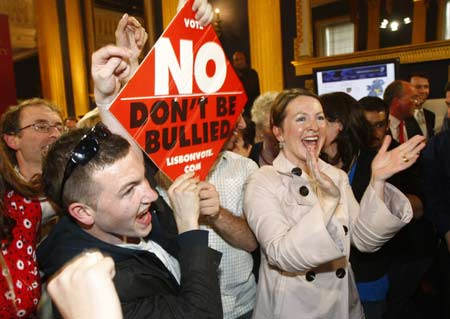News, June 2008
Archives
Mission & Name
Conflict Terminology
Editorials
Gaza Holocaust
Gulf War
Isdood
Islam
News
News Photos
Opinion Editorials
US Foreign Policy (Dr. El-Najjar's Articles)
www.aljazeerah.info
|
Editorial Note: The following news reports are summaries from original sources. They may also include corrections of Arabic names and political terminology. Comments are in parentheses. |
|
Ireland rejects Lisbon Treaty, EU expresses regret www.chinaview.cn 2008-06-14 04:39:35LONDON, June 13 (Xinhua) -- Irish voters on Friday rejected the Lisbon Treaty on European Union (EU) reform, dealing a heavy blow to the bloc's hopes of putting the treaty into effect from Jan. 1,2009. Official results show that 53.4 percent voters vetoed the treaty in the referendum, Sky News reported. Irish Prime Minister Brian Cowen said he was disappointed with the result but the government "accepts and respects the verdict of the Irish people." The Lisbon Treaty, signed by European leaders last December, is designed to make much-needed institutional reforms in the EU possible. The treaty must be ratified by all 27 member states before it can take effect. It has so far been ratified by two thirds of them. Ireland was the only country to hold a public ballot on the treaty and the "No" vote is believed to have plunged Europe into a difficult situation.
Slovenian Prime Minister Janez Jansa, whose country holds the rotating EU presidency, expressed regret at the outcome of the Irish vote. The Slovenian presidency "deeply regrets" this outcome, said Jansa, while adding: "We respect the democratic will of the Irish voters." Cowen is expected to explain the reasons behind his country's rejection of the treaty when the heads of state and government of EU member states meet next week, Jansa said. "We will discuss the situation and look for ways to move forward." The Irish "No" vote should not be seen as "voting against the European Union," Jose Manuel Barroso, the European Commission President, said in Brussels.
Other EU states "should continue to ratify the treaty despite the Irish result," he said, adding that there should be a collective response to solving the issue of building a strong Europe, he said. German Chancellor Angela Merkel and French President Nicolas Sarkozy also urged other EU nations to continue the ratification process in spite of the Irish rejection. |
Early referendum returns in Ireland suggest "No" vote to Lisbon Treaty
www.chinaview.cn 2008-06-13 20:34:42
LONDON, June 13 (Xinhua) --
Early returns in Ireland's referendum on the European Union's (EU) Lisbon Treaty have pointed to a "No" vote, Sky news reported on Friday.
Tallymen, the political party monitor, was quoted by Sky news as saying that five Dublin constituencies indicated a "No" vote, with three evenly divided for and against and one in favor.
The city of Dublin accounts for about a quarter of the country's 2.8 million electorate.
Irish Justice Minister Dermot Ahern was also quoted as saying unofficial tallies showed Ireland has rejected the European Union reform treaty.
Meanwhile, observers saID a low turnout had already suggested a "No" vote is on the cards.
A 45-percent turnout had been predicted to be the minimum required for a "Yes" vote, but outside Dublin levels fell far short of that figure.
Referendum results are due to be announced on Friday afternoon.
Ireland is the only country in the European Union that holds a referendum on the EU reform treaty. So far 18 of the 27 EU member states have ratified the treaty through their parliaments.
The eyes of the whole Europe are now on Ireland as the country's 2.8 million voters would decide whether 500 million EU citizens should be governed under the Lisbon Treaty, which replaces the failed constitution rejected by the French and the Dutch in 2005.
Major parties in Ireland except Sinn Fein have been vigorously campaigning for the treaty in recent months. Many voters were still swinging between "Yes" or "No" before the vote.
Irish Taoiseach Brian Cowen has warned that a "No" vote would damage not only Ireland but also Europe as a whole.
Sinn Fein however believes the Treaty would undermine Ireland's sovereignty on moral, military and financial matters.
The Lisbon Treaty is drafted to reshape EU institutions and resurrect major reform proposals embodied in the failed 2005 constitution. The treaty creates potentially powerful new roles for an EU president and foreign policy chief, and streamline the EU decision-making by reducing national veto powers.
Under the Treaty, the European Commission would be cut down from 27 to 18 members, the EU decision-making process would be based on majority instead of unanimous votes and the policy-making power of the 785-seat European Parliament would be strengthened.
|
|
|
|
||
|
||||||




